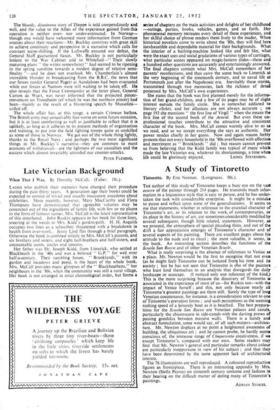Late Victorian Background
When That I Was. By Dorothy McCall. (Faber. 18s.), LADIES who publish their memoirs have changed their procedure during the past thirty years. A generation ago their books could be expected to consist of trivial and usually inaccurate anecdotes about celebrities. More recently, however, Mary MacCarthy and Flora Thompson have demonstrated that agreeable volumes may be concocted out of the ingredients of family life, with few or no plums in the form of famous names. Mrs. McCall is the latest representative of this sisterhood. John Ruskin appears in her book for three lines, sneering at the weeds in Mrs. Kidd's garden-path. H. H. Asquith occupies two lines as a schoolboy threatened with a breakdown in health from over-work. Jenny Ljnd flits through a brief paragraph. Otherwise the book is confined strictly to Mrs. McCall's parents, and six brothers and sisters, and eight half-brothers and half-sisters, and uncountable aunts, uncles and cousins.
Her father m as Dr. Joseph Kidd, from Limerick, who settled at Blackheath in the '40s and was a beloved " G.P." for well over half-a-century. Their rambling house, " Brooklands," with its garden and meadows and pond, is the heart of the whole book. Mrs. McCall provides many glimpses of the " Blackheathens," her neighbours in the '80s, when the community was still a rural village. Her book is not arranged in strict chronological order, but forms a
series of chapters on the main activities and delights of her childhood —outings, parties, books, vehicles, games, and so forth. Her phenomenal memory recreates every detail of these experiences, and her skilful choice of phrase renders them lively to the reader, When historical novelists come to write about the '80s, they will find here inexhaustible and dependable material for their backgrounds. What the interior of a bathing-machine looked like and felt like, what were the exact uses and social gradations of various types of carriages, what particular scenes appeared on magic-lantern slides—these and a hundred other questions are accurately and entertainingly answered. The final chapters contain what Mrs. McCall remembers of her parents' recollections, and thus carry the scene back to Limerick at the very beginning of the nineteenth century, and to naval life at Portsmouth just after the Napoleonic era. Inevitably these stories, transmitted through two memories, lack the richness of detail possessed by Mrs. McCall's own experiences.
She states that the book was first planned merely for the informa- tion of her grand-children, and a few of its pages may be of slight interest outside the family circle. She is somewhat addicted to literary clichés, and her allusions are not always accurate ; on page 193 she mentions " the first line of Virgil " when she means the first line of the second book of the Aeneid. But even these un- professional touches contribute to the attractive and consistent character of the book. Mrs. McCall comes warmly alive to us as we read, and so we accept everything she says as authentic. Her power resides chiefly in her gusto. Now and again reason feebly protests that not every household in the '80s overflowed with affection and merriment as " Brooklands " did ; but reason cannot prevent us from believing that the Kidd family was typical of many which made the late Victorian era, whatever its shortcomings, a time when


































 Previous page
Previous page